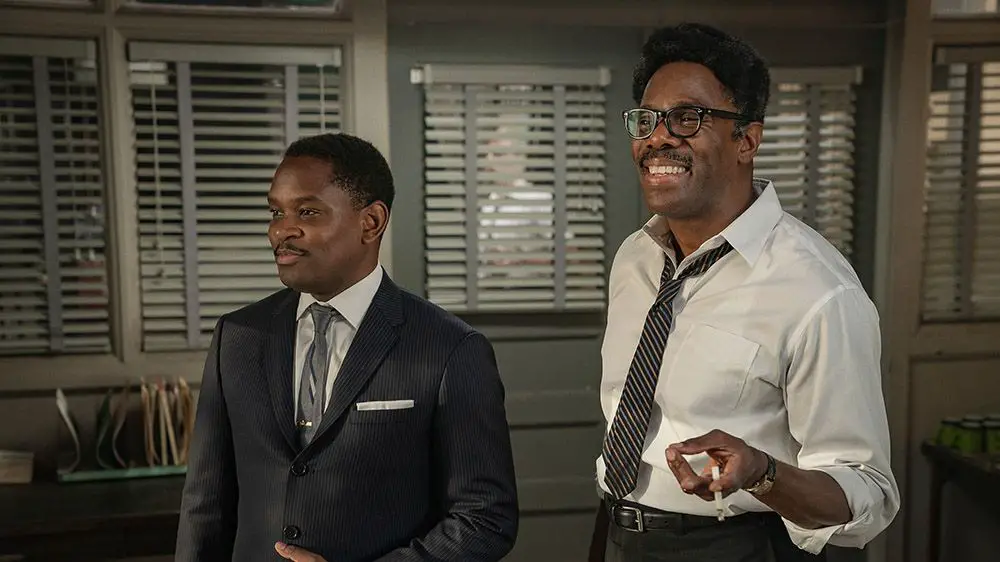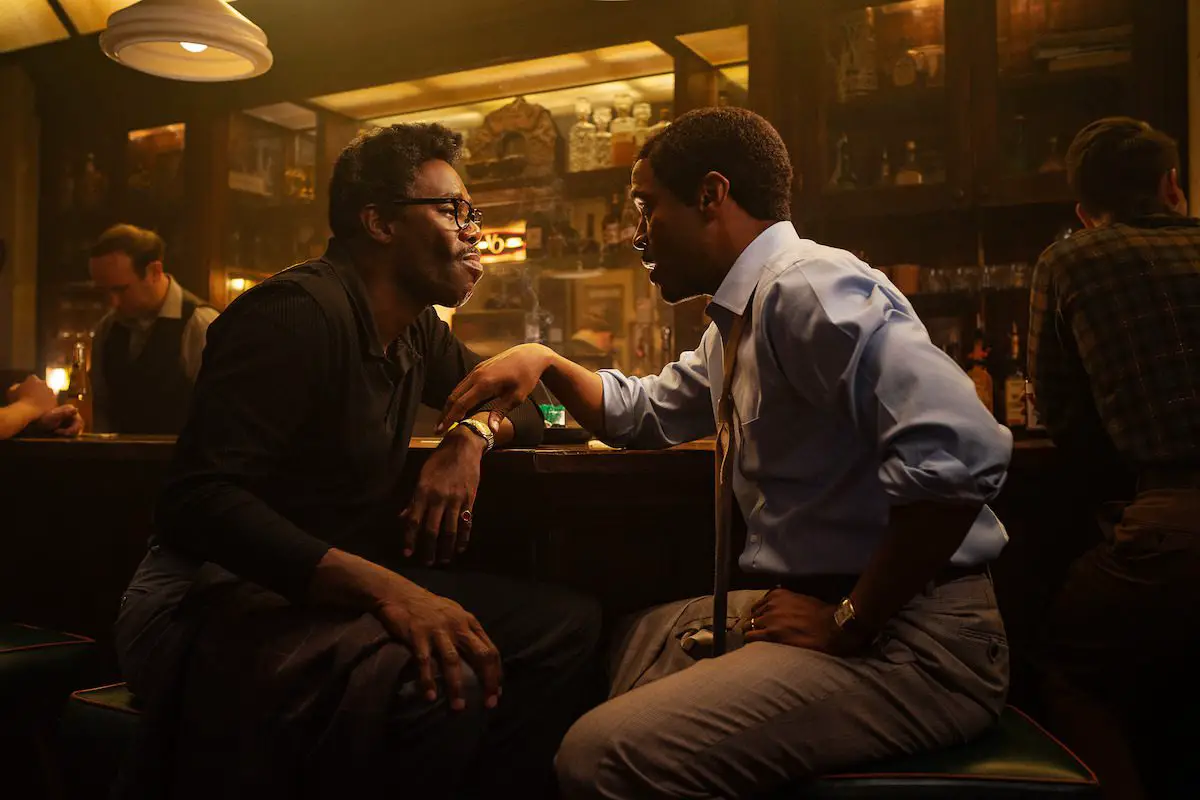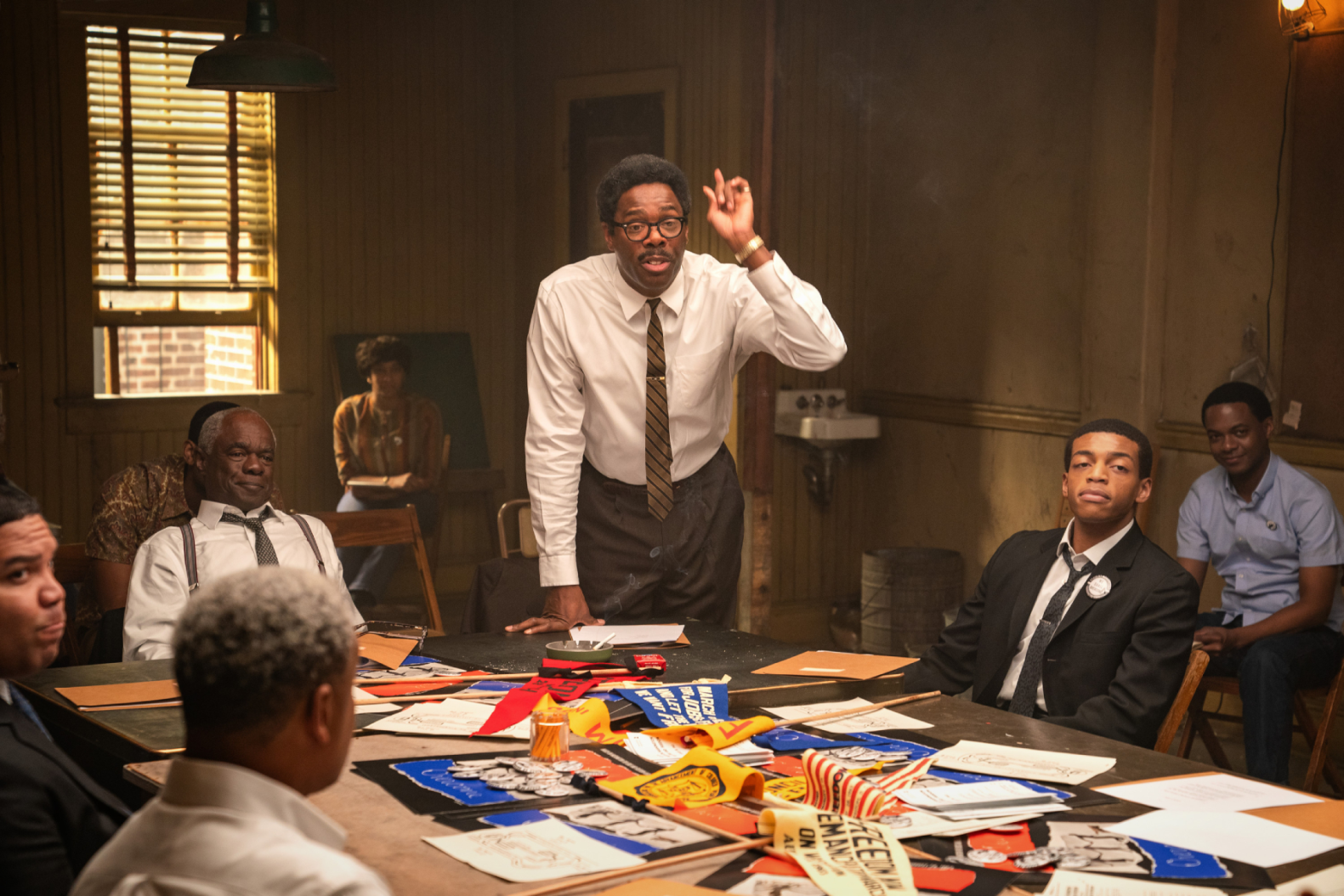Unlike most biopics, Rustin satisfies itself with a single event in its subject’s life. In this case, Bayard Rustin’s attempt to organize the now infamous 1963 civil rights March on Washington. The film is not interested in Bayard’s past or future, merely in his life regarding this moment.
Whatever flaws may ail Rustin, director George C. Wolfe’s and his writers Julian Breece and Dustin Lance Black’s decision to keep it focused is not one of them. Wolfe has his roots in the theater, as evidenced in another film he did, Ma Rainey’s Black Bottom. Rustin is steeped in theatricality, with Mark Ricker’s sets striking a balance between feeling lived in and evocative abstract space.

Yet, what makes Rustin compelling above all else is Coleman Domingo’s supernova turn as Bayard Rustin. It would be a star-making performance if he weren’t already a star. Domingo fireman carries Rustin through its peaks and valleys to the climatic end. He lends a breathless vibrance to Wolfe’s film, sparking a fire underneath even the driest exposition.
It’s a good thing, too, since Rustin is partially full of a stacked cast, but a few choice stunt castings almost cancel them out. The most egregious one is Chris Rock, as the head of the NCAAP Roy Wilkins. Rock has a presence and talent, but when he’s onscreen against Domingo or Aml Ameen as Martin Luther King, Jr., he’s all but blown off the screen. All bluster and no nuance while Domingo and Ameen act their heart out.
Bayard Rustin may be unknown to those whose knowledge of the Civil Rights Movement comes from Hollywood. But he is a vital and committed fighter of the cause, to say nothing of being one of the few openly gay Black activists of the time. An aspect that more than a few people from Strom Thurmond and Roy Wilks tried to use against him.
Rustin doesn’t shy away from Rustin’s homosexuality. A benefit of having a gay director and a gay star is that they allow for truth and understanding in expressing the pain and anger specific to being a Black gay man during the ’60s. Rustin is at its best when it will enable Domingo’s Bayard to get lost in his words.
Talking to Dr. King, he says, “You are one of the smartest men I know, so explain to me why, after all that’s left undone, am I yet again forced to justify my existence.” The exasperation of having to justify your existence as a Black man must be intolerable, but add to it the added fact of having to justify it to the very people who are fighting along with you must be heartbreakingly exhausting. Rustin shows how the fear of being abandoned by Martin, yet again, for his open Queerness, weighs on his mind.
Bayard feels every slight and every threat because, to him, it means another link in a chain of excuses from the respectable leaders of the movement to dump him by the wayside. Wolfe and the great Tobias A. Schliessler’s camera find ways to frame Bayard’s fragile emotional state through either framing or utilizing Andrew Moundshein’s editing; because of this, Rustin feels immediate and vital in a way that historical biopics often feel dry and removed.

An accomplishment due to Breece and Black’s script, which, far from shying away from the petty beef and significant political differences between the Civil Rights Leaders, relishes them. From time to time, Rustin falls into old traps, such as when Schliessler’s camera pans around the table, pausing on the faces long enough so text can appear onscreen to tell us who they are. At others, it crackles when the leaders hurl insults at one another or give each other a hard time.
Rustin is at its best when it allows the humanity of the Civil Rights Movement to shine through. The moments when Wolfe takes time to show us how Rustin retrained an army of Black cops to being non-violent pacifist officers are all too brief. Despite its briefness, I found the scene impossible to turn away from because, in this brief moment, Wolfe and his team show how a cop’s first response to any insult or threat is violence. Bayard has to wrestle the notion out of their heads as he tells them to leave their guns at home. When one officer tells them the law compels them to be armed at all times, he brazenly suggests he break the law.
At the heart of Rustin is the affair between Bayard and Elias Taylor (Johnny Ramey), a fellow activist and Pastor in search of a congregation. Unlike the Quaker Bayard, Elias is married and very religious. The two begin an uneasy affair that soon turns too easy for Elias and ends in heartbreak for Bayard. The chemistry between the two won’t melt the screen, but Domingo’s seduction of the young Pastor provides all the heat we need.
Whatever problems I may have, the fact that Rustin has a gay sex scene, tasteful, but they’re all the same, puts it in a class all by itself. Schlesinger and Wolfe shroud the scene in Blackness with enough light to see Domingo and Ramey and find understanding and love within each other, if only for a short while. In an increasingly sexless sphere it’s nice to see artists remind us that historical figures had urges and drives that were as human as they were.
Rustin endeavors to show us that the Civil Rights Movement didn’t just happen. That it took planning-monumental planning-strategizing, philosophizing, arguments, backroom dealing, publicity stunts, and so much more. A collective effort for a single goal where not everyone got along and lofty ideals or no-sometimes you have to deal with jerks.
In many ways, Rustin shows Wolfe embracing the cinematic elements of the film. He even cuts into real-life documentary footage of the March. One scene has Bayard getting onto a bus to reconcile with Martin. Bayard imagines sitting up front, saying brave and pithy statements to the cops who harass him, only to be pulled off and beaten while the Whites on the bus look away. Moundshein’s editing cuts to Bayard brushing off a seat in the back of the bus. Melodramatic, yes, but it shows how making every moment of your life a social protest wears on you, especially if there’s a larger goal you’re trying to reach, but the indignities wear on you all the same.
Another scene has Bayard running down the street and cuts to him sitting on the train, covered in sweat, surrounded by people; Schliessinger’s camera slowly zooms on him to give the feeling of claustrophobia, do a good job of giving us an insight to Bayard’s pressurized emotional state.
Still, Rustin is too full of moments where Bayard is forced to be merely an onlooker. Whether it’s him standing in the center of his Utopia Neighborhood Club House, the nerve center for Bayard’s planning, listening to Strom Thurmond attack him, or standing behind Martin Luter King., Jr. as he gives his legendary “I Have A Dream Speech”; the result at times feels like us watching Bayard watching other people.
Were it anyone else, these moments would be disastrous. But since it’s Domingo’s face, the film merely falters instead of collapsing.

As much as the film doesn’t shy away from Bayard’s homosexuality, it does go to great lengths to downplay his ties to communism. Communism for Blacks during the Civil Rights Era is often watered down and paved over for fear of exposing how Communists of the time were on the right side of history. Unsurprisingly, they would try to distance Bayard from his affiliations, but it is more than a little disappointing. Rustin’s breaking of the party is framed in the context of being anti-communist and not for what it was: a Pacifist protesting his party’s reversal of its anti-war position to support World War II.
Still, one of the biggest blunders in Rustin is its treatment of women. Women exist in Rustin in a way they often do not live in other films about famous Black men. They are fellow organizers with ideas and thoughts that contribute. But Wolfe and his team make the unforced error of wasting CCH. Pounder as Dr. Anna Hedgeman. He and the script reduce this significant figure of the movement to a smiling, benevolent Black mother figure for most of the film.
So much so that when Anna leaps out of her chair during a meeting to complain about how the men have ignored the women leaders, it feels as if the filmmakers themselves have forgotten about them. Two scenes point out how the march sidelined women of the movement, but Wolfe and his team’s mentioning it reeks of acknowledging the issue instead of engaging with it.
It feels clumsy in a film in love with passionate people expressing big ideas passionately and eloquently. Because the dialogue, primarily when delivered from Domingo, sings with a kind of truth and poetry. Breece and Black’s script may stumble occasionally, but the conversation flows freely and smoothly, and when you have an instrument like Domingo singing the tune, it becomes the best kind of music.
Images courtesy of Netflix
Have strong thoughts about this piece you need to share? Or maybe there’s something else on your mind you’re wanting to talk about with fellow Fandomentals? Head on over to our Community server to join in the conversation!

